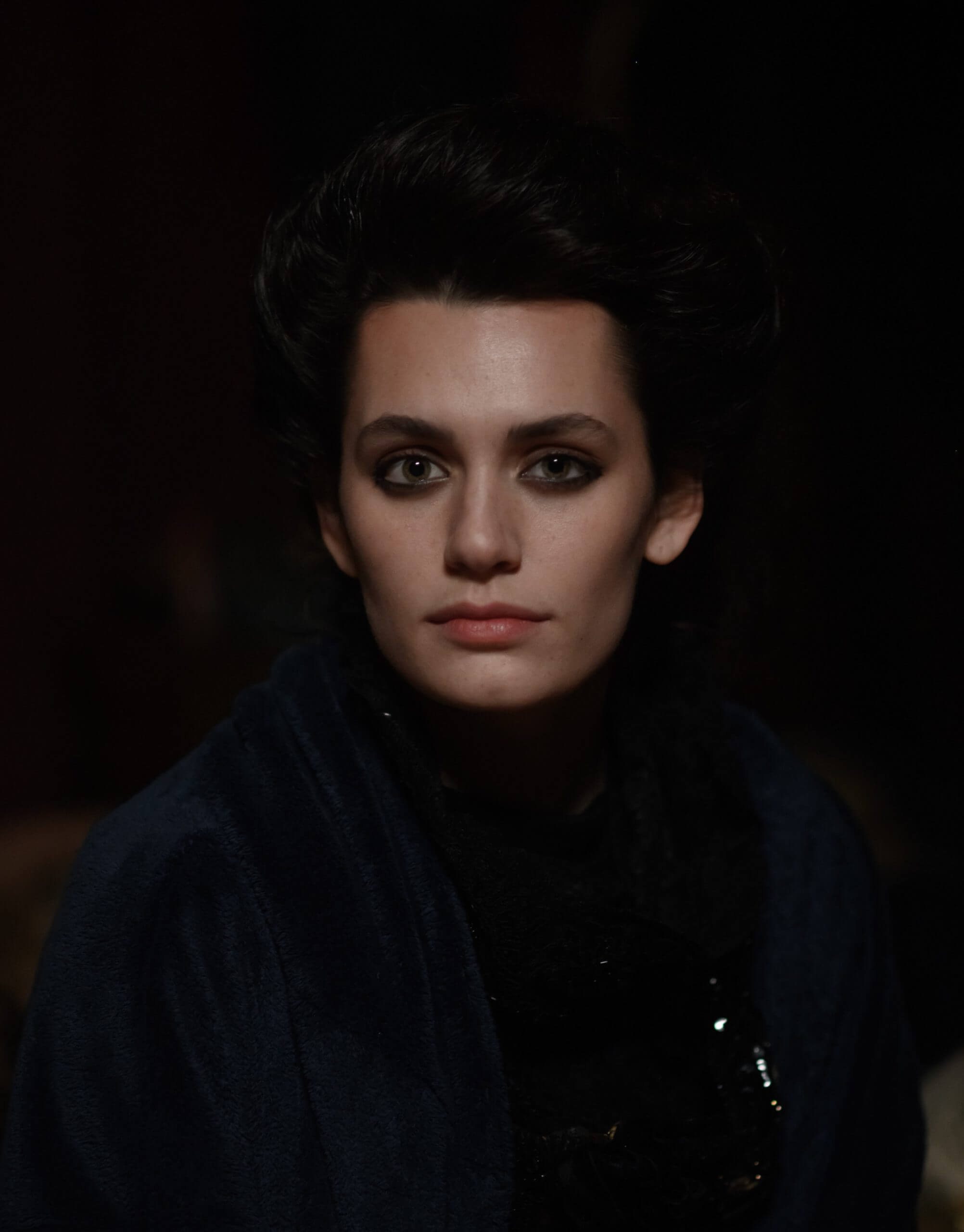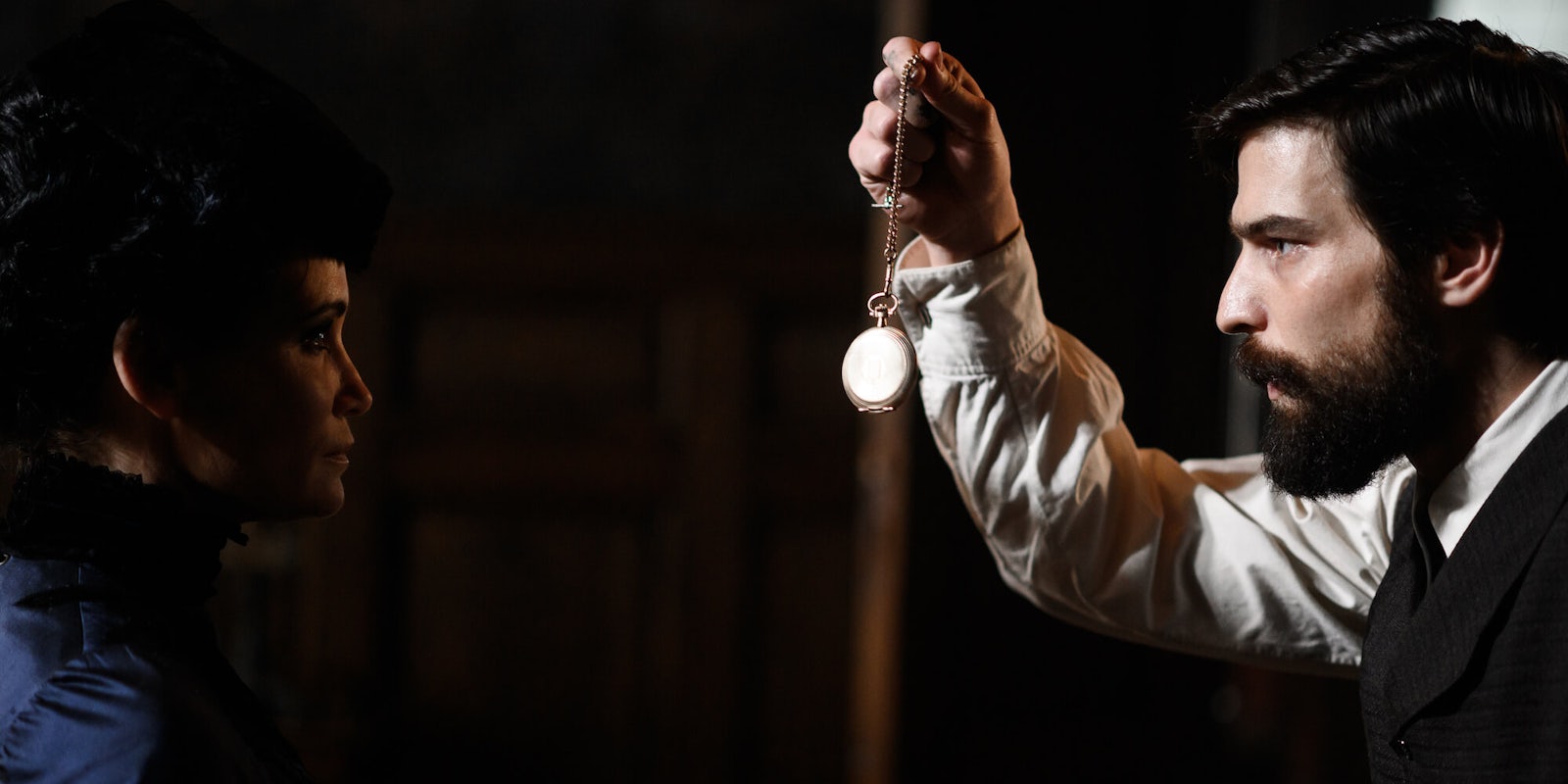In recent years, the global entertainment industry’s fixation on “IP”—intellectual property— has led to the emergence of a niche but popular new genre: miniseries based on a remarkable historical figure. These shows include FX’s celebrated Fosse/Verdon, National Geographic’s Genius, which has depicted the lives of Albert Einstein and Picasso, and a forthcoming miniseries on Leonardo da Vinci. The Austrian show Freud, which premiered this week on Netflix and depicts Sigmund Freud as a young doctor in Vienna, would seem to follow this pattern. But creators Stefan Brunner, Benjamin Hessler, and Marvin Kren have taken a different route. Instead of crafting a historical biopic of Freud, they have chosen to depict him as a… demon-hunter?
CREATORS: Stefan Brunner, Benjamin Hessler, and Marvin Kren
STREAMING: Netflix
A young Sigmund Freud investigates a paranormal mystery in this absurd new Austrian television show.
The sheer audacity required to create a show in which Sigmund Freud assists detectives in investigating a series of murders, magically hypnotizes people, and becomes involved in demonology must be applauded. Rarely has anything so ambitiously stupid graced our television screens. The Freud of Freud, played with stoical hunkiness by Robert Finster, is something of a Sherlock Holmes, a deductive genius who uses his powers of psychological (read: paranormal) intuition to assist a pair of renegade policemen in a quest to discover who is behind a series of grotesque and sadistic murders in Vienna. These nefarious deeds can be traced back to a pair of scheming Hungarian nationalists, Sophia (Anja Kling) and Victor von Szápáry (Philipp Hochmair), who are working to get close to Austria’s Crown Prince Rudolf (Stefan Konarske) for their own dastardly purposes. Sophia can hypnotize people, permanently, by touching them. Victor has a goatee.
Their niece, Fleur Salomé (Ella Rumpf), has psychic abilities of her own: when she falls into trances, she has real visions of the murders taking place around the city. Freud, who has struggled to convince his colleagues of the validity of hypnosis as a medical treatment, begins to hypnotize her to access her knowledge of these crimes—he, too, can soon hypnotize people at the mere touch of a hand—but Fleur is unstable, and Sophia manipulates her to her own ends. Rumpf is the stand-out of Freud, at least until she becomes possessed by a supernatural entity and turns into a sex-crazed maniac: unlike the other actors on the show, who simply embody predictable archetypes, Rumpf’s vivid screen presence elevates Fleur into a sympathetic hysteric instead of a caricature.
There is a pulpy satisfaction to Freud, which is handsomely produced and satisfyingly plotty. Fleur’s visions, in particular, are effectively spooky, and some of the gorier images are inventively unsettling. The show seems obviously influenced by the recent American program Penny Dreadful, a campy mash-up of famous Victorian novels including Frankenstein and Dracula. Penny Dreadful also featured a young, dark-haired woman in touch with the supernatural and a domineering older woman who attempts to manipulate her. But that show was deliberately campy and self-aware about its heightened aesthetic, and it benefitted from dramatizing the lives of famous fictional creations, and not a real historical figure. Freud is not as intelligent or as enjoyable, and the absurdity of its premise keeps its audience at a remove.

The show bears so little resemblance to reality that comparing the fictional Sigmund Freud to the real one feels like a fool’s errand. The show is not interested in the real Freud; instead, it shows his fictional alter-ego smoking cigars and using copious amounts of cocaine. (Freud did use cocaine during this period of his life.) Nevertheless, Freud does nominally depict the early stages of Freud’s career, and specifically focuses on the process of hypnosis, which was then in vogue in Europe. French doctor Jean-Martin Charcot, a highly influential neurologist in the late nineteenth-century, advocated for hypnosis as a treatment for hysteria in patients; as John Kerr writes in A Most Dangerous Method, his superb biography of Freud, Carl Jung, and Sabina Spielrein, Charcot’s traumatized patients obligingly faked the hypnotic responses Charcot expected them to experience in order to please him and his colleagues. Freud himself experimented with hypnosis, without much success, and abandoned it when he began to develop his own practice of psychoanalysis, in which patients articulated and analyzed their past experiences and traumas instead of (supposedly) hypnotically regurgitating them.

But hypnosis remained a subject of fascination for psychologists long after Charcot’s time; most notably, it was used extensively during and after the First World War in Britain to treat shell shock. The connection between hypnosis and trauma goes beyond its practical application as a medical intervention: although Charcot’s patients might not actually have been hypnotized, Ruth Leys suggests in Trauma: A Genealogy that his and others’ advocation of hypnosis was crucial to the development of the concept of trauma. These early doctors conceived of trauma as an experience that their patients could not consciously access—hence the need for hypnosis. Much of our idea of trauma today still stems from this principle, whether or not traumatized individuals have literally repressed their experiences.
All of this is rich fodder for drama. (Christopher Hampton did just that in his play A Dangerous Method, based on the abovementioned book, which David Cronenberg adapted into a film of the same name in 2011.) But Freud, despite its paltry efforts to depict Fleur’s childhood trauma in flashbacks, is not particularly interested in the realities of trauma or hypnosis. Hypnosis in the show is a magical process that Sophia and Freud can conduct at will, and it is mostly deployed to encourage characters to carry out nefarious acts. At the end of the show, Freud attempts to argue that the characters who committed particularly perverse crimes while under hypnosis were acting out their deepest fantasies, but this explanation falls flat. The characters who commit crimes are, for the most part, thoroughly under-developed, and the show only vaguely gestures at their supposed dysfunctions, occasionally by using hackneyed Freudian symbols, and instead focuses on the more paranormal elements of hypnosis. The audience is left with the impression, then, that these characters are acting primarily due to external compulsion, not because their unconscious desires have been unleashed.
This inability to engage with psychology is the show’s greatest failure. A pulpy, supernatural detective show about Sigmund Freud is a laughable prospect, but this show might have been able to succeed on its own terms as a camp curiosity if its creators had been willing or able to depict its characters’ childhood traumas and neuroses. This is not a tall order. Freud is a fascinating and remarkable figure in large part because his influence is still so powerfully felt: many of his most basic principles and ideas are so deeply ingrained in the culture that even people who have never read him understand them intuitively. You do not need to have studied psychoanalysis to understand Oedipal relationships, or to know that sexual dysfunctions typically begin in childhood. Pulp entertainment like Penny Dreadful and other mystery and horror films and television shows make constant use of his ideas. It is absurd that a show literally about him should have such a weak grasp on these basic concepts. But perhaps the show’s creators, who are children of Freud as we all are, were merely rebelling against their father.
Looking for something more specific? Here are our Netflix guides for the best war movies, documentaries, anime, indie flicks, true crime, food shows, rom-coms, LGBT movies, alien movies, gangster movies, Westerns, film noir, and movies based on true stories streaming right now. There are also sad movies guaranteed to make you cry, weird movies to melt your brain, old movies when you need something classic, and standup specials when you really need to laugh. Or check out Flixable, a search engine for Netflix.
12 Best Netflix Original Docuseries:


